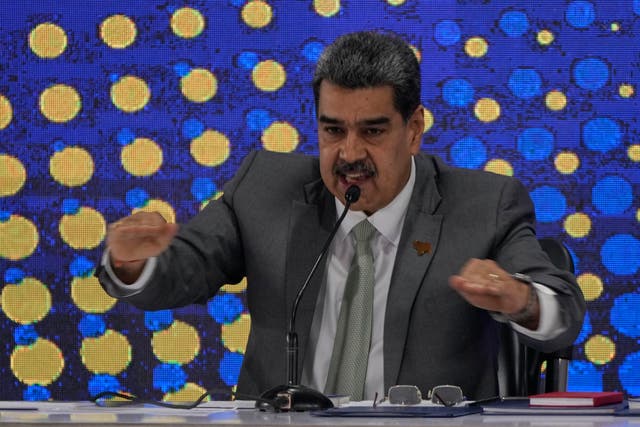Venezuela and Guyana agree to ‘high-level meeting’ over disputed territory
Saint Vincent and the Grenadines prime minister says his country will host both presidents for talks over Essequibo.

The presidents of Venezuela and Guyana have agreed to meet over a sovereignty dispute involving an oil and mineral-rich territory.
Venezuela voted in a referendum to claim Essequibo, which it says was stolen when the border was drawn more than a century ago, but Guyana has vowed to protect its sovereignty.
A statement from the Venezuelan government of president Nicolas Maduro on Saturday said it had accepted a proposal “to hold a high-level meeting” with its neighbour.
The statement said it had agreed to the talks to preserve its “aspiration to maintain Latin America and the Caribbean as a zone of peace, without interference from external actors”.

Mr Maduro “received” the proposal in conversations with Brazil President Luiz Inacio Lula da Silva and Saint Vincent and the Grenadines Prime Minister Ralph Gonsalves, according to the statement.
In a letter to Mr Maduro and Guyana President Irfaan Ali, Mr Gonsalves expressed an “urgent need to de-escalate the conflict” and said both presidents have agreed to meet on Thursday in his country.
The announcement of the talks comes after Guyanan vice president Bharrat Jagdeo warned Guyana would protect its sovereignty over Essequibo.
“Any attempts by his state oil firms or state corporations to explore for petroleum in our area will be viewed as an intrusion by Guyana,” said Mr Jagdeo.
“If (Mr Maduro) believes that belligerence and threatening Guyana will lead to the desired bilateral conversations, he is profoundly incorrect.”

The UN Security Council held an emergency, private meeting on Friday as world leaders and international organisations backed Guyana. Members of a regional trade bloc known as Caricom also called a closed-door meeting to talk about the dispute.
Venezuela says it was the victim of a land theft conspiracy in 1899, when Guyana was a British colony and arbitrators from Britain, Russia and the United States decided the boundary.
They argue a 1966 agreement among Venezuela, Britain and the colony of British Guiana effectively nullified the original arbitration.
Guyana maintains the initial accord is binding and asked the United Nations’ top court to rule it as such in 2018, but a decision is years away.
The dispute has been heightened since 2015 when oil deposits were discovered off the coast of Essequibo – the first oil pumped ashore in December 2019 turning Guyana into the world’s fourth-largest offshore oil producer.
Despite having the world’s largest proven crude reserves, Venezuela’s oil industry has been crippled by years of mismanagement and economic sanctions imposed on the state-owned oil company following Mr Maduro’s re-election in 2018.





